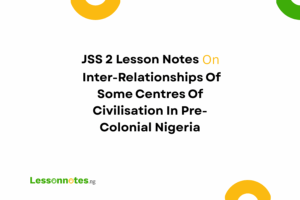Peacekeeping/Socio-Political Interest Of The Developed Societies SS3 Nigerian History Lesson Note
Download Lesson NoteTopic: Peacekeeping/Socio-Political Interest Of The Developed Societies
SPECIFIC OBJECTIVES: At the end of the lesson, pupils should be able to
- Define peacemaking
- Identify examples of international and regional peacekeeping Initiatives
- Identify the aims and objectives of Peacekeeping
- Identify the achievements and failures of peacekeeping forces
INSTRUCTIONAL TECHNIQUES:
- Identification,
- explanation,
- questions and answers,
- demonstration,
- videos from source
INSTRUCTIONAL MATERIALS:
- Videos,
- loudspeaker,
- textbook,
- pictures,
NOTE
PEACEKEEPING AND SOCIO-POLITICAL INTEREST OF THE DEVELOPED SOCIETIES
Meaning of Peacekeeping
Peacekeeping refers to the deployment of international forces, usually military personnel, to regions of conflict or potential conflict to maintain or restore peace and stability. These forces operate under the authorization of the United Nations or regional organizations and are tasked with various duties, including monitoring ceasefires, patrolling borders, protecting civilians, and assisting in the implementation of peace agreements. Examples of International and regional Peacekeeping Initiatives:
- International Example- United Nations Peacekeeping: One of the most prominent examples of international peacekeeping is the United Nations Peacekeeping Operations, which has been deployed to numerous conflict zones around the world, including Cyprus, the Democratic Republic of the Congo, and Haiti.
- Regional Example– African Union Mission in Somalia (AMISOM): AMISOM is a regional peacekeeping mission operated by the African Union in Somalia. It aims to stabilize the country, support the Somali government, and combat militant groups like Al-Shabaab.
Aims and Objectives of Peacekeeping
- The primary aim of peacekeeping is to prevent the outbreak of violence or to intervene in ongoing conflicts to facilitate peaceful resolutions.
- Peacekeeping forces often work to protect civilians from violence, displacement, and human rights abuses.
- Peacekeepers may assist in the delivery of humanitarian aid, including food, medicine, and shelter, to populations affected by conflict.
- Peacekeeping missions may help facilitate political negotiations, elections, and the establishment of stable governance structures.
Achievements and Failures of Peacekeeping Forces
Achievements:
- Peacekeeping forces have successfully prevented many conflicts from escalating into full-scale wars.
- Peacekeepers have facilitated dialogue and negotiations between conflicting parties, leading to peace agreements and reconciliation.
- Peacekeeping missions have protected countless civilians from violence and human rights abuses.
Failures:
- Peacekeeping missions are often hampered by limited mandates, resources, and authority, making it difficult to effectively address complex conflicts.
- Peacekeeping forces may lack the necessary manpower, equipment, or logistical support to fulfil their mandates adequately.
- Maintaining neutrality can be challenging, especially when peacekeepers face pressure from conflicting parties or are perceived as taking sides in a conflict.
EVALUATION:
- Define peacemaking and give examples
- Identify 3 aims and objectives of Peacekeeping
- Identify 3 achievements and failures of peacekeeping force.





















